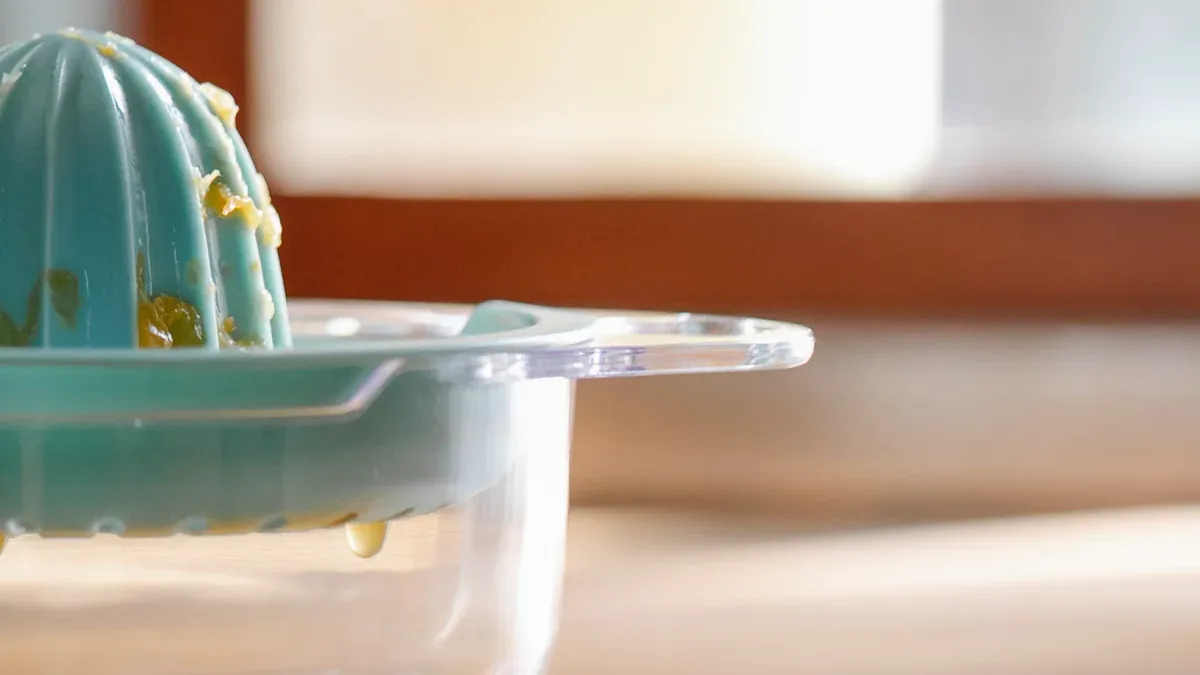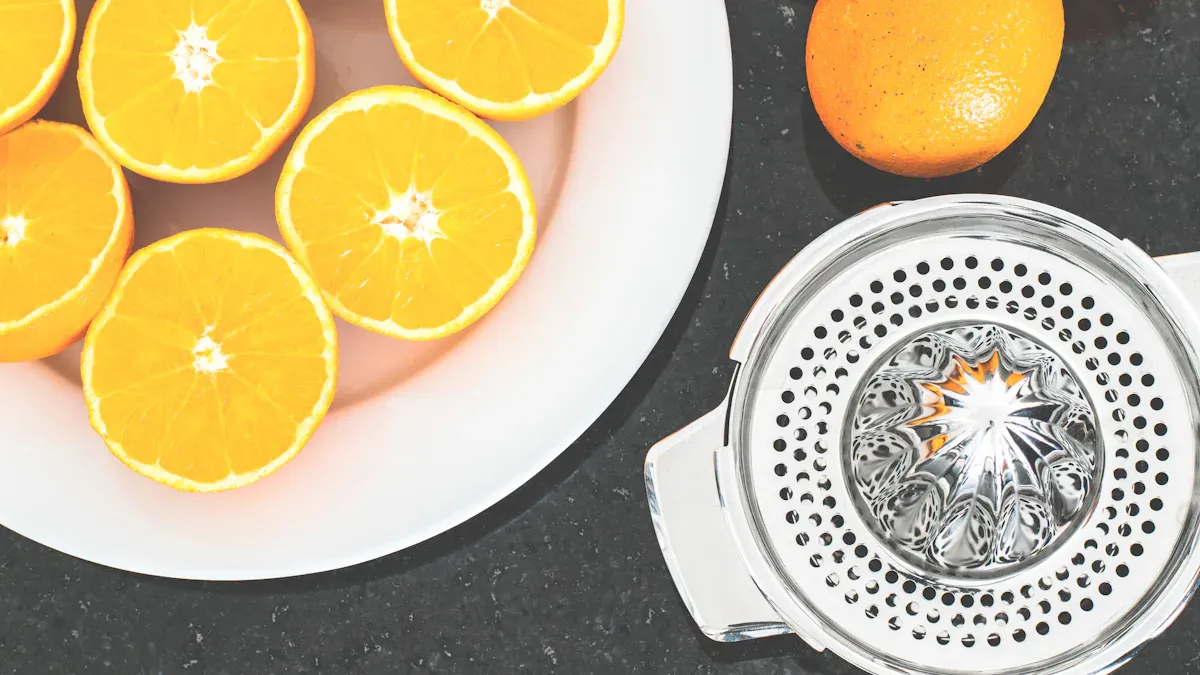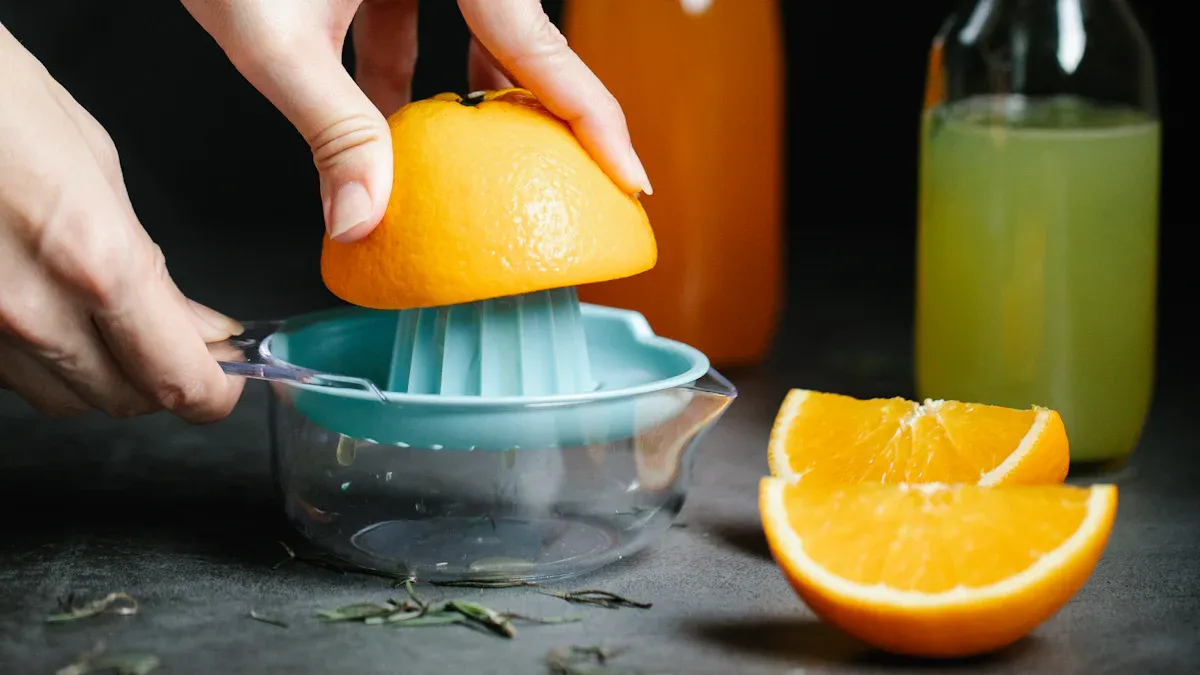
OEM citrus juicer mold customization service provides businesses with the ability to create unique, tailored molds for juicers. This service plays a crucial role in helping brands stand out in a competitive market. Customization enhances product functionality, aligns designs with brand identity, and ensures a superior user experience, ultimately driving customer satisfaction and loyalty.
Key Takeaways
- Custom molds for citrus juicers help brands make special designs. These designs show their style and make customers remember them.
- Special molds make juicers work better, giving users a great experience. Features like comfy handles and easy juice squeezing make customers happy.
- Spending money on custom molds helps brands compete and stay ahead. It lets them adjust fast to changes and be different from plain products.
Why Choose OEM Citrus Juicer Mold Customization Service?
Tailored Designs for Brand Identity
OEM citrus juicer mold customization service enables businesses to create designs that reflect their unique brand identity. Custom molds allow companies to incorporate logos, specific color schemes, and distinctive shapes into their products. These elements help establish a strong visual connection with customers, fostering brand recognition and loyalty. By aligning product aesthetics with brand values, businesses can differentiate themselves in a crowded marketplace. This approach not only enhances the appeal of the product but also strengthens the overall brand image.
Enhanced Functionality for Better User Experience
Custom molds offer the flexibility to optimize functionality based on user needs. Businesses can design juicers with ergonomic handles, improved juice extraction mechanisms, or features that simplify cleaning. Enhanced functionality leads to better user satisfaction, as products become more intuitive and efficient. Performance metrics such as task completion rates and usability testing highlight the impact of these improvements. For instance, usability testing identifies pain points, while A/B testing compares design variations to determine the most effective solution. These insights ensure that the final product delivers a seamless experience for users.
| Metric/Feedback Method | Description |
|---|---|
| Task completion rates | Assesses how efficiently users can accomplish specific tasks within the interface. |
| Usability testing | Observes users interacting with the design to identify pain points. |
| A/B testing | Compares different design variations to determine which performs better with users. |
Competitive Advantage in the Market
OEM citrus juicer mold customization service provides businesses with a competitive edge. Customization allows companies to offer unique products that stand out from generic alternatives. Tailored designs and enhanced functionality attract more customers, increasing market share. Additionally, businesses can respond quickly to changing consumer preferences by adapting molds to meet new demands. This agility ensures that companies remain relevant and competitive in a dynamic industry. By investing in customization, businesses position themselves as innovators, gaining the trust and loyalty of their target audience.
How the Customization Process Works

Initial Consultation and Requirement Analysis
The customization process begins with a detailed consultation to understand the client’s specific needs. This stage involves gathering information about design preferences, functional requirements, and production goals. Advanced tools like Mold Flow Analysis play a critical role in this phase. For example:
- An automotive manufacturer used Mold Flow Analysis to reduce material usage by 15%, speed up production cycles by 20%, and minimize defects.
- Mold Flow software also enables the optimization of designs for complex geometries and material properties, ensuring the final product meets project-specific demands.
This thorough analysis ensures that the OEM citrus juicer mold customization service delivers solutions tailored to the client’s unique objectives.
Prototyping and Precision Testing
Once the requirements are defined, the next step involves creating prototypes and conducting rigorous testing. Prototypes undergo visual inspections to identify shape inaccuracies, surface defects, and cosmetic issues. Stakeholder testing allows end users to evaluate ergonomics and usability, providing valuable feedback for refinement.
Key adjustments during this phase may include:
- Smoothing surface defects in the mold.
- Modifying thermal regulation to address warpage.
- Adding vents to eliminate trapped gases.
High precision is essential, especially for applications requiring tolerances as tight as ±0.05 mm. Consistent wall thickness, material strength, and structural reinforcements are also prioritized to ensure the prototype’s reliability and performance.
Final Production and Delivery
The final stage focuses on efficient production and timely delivery. Manufacturers monitor key metrics to ensure quality and customer satisfaction:
| Metric | Description |
|---|---|
| On-time delivery performance | Measures the ability to meet customer delivery expectations. |
| Order fill rate | Percentage of orders fulfilled completely and on time. |
| Perfect order index (POI) | Percentage of orders delivered without issues (complete, on time, undamaged). |
| Overall Equipment Effectiveness | Productivity measure based on availability, performance, and quality. |
| Cycle times | Average time taken to produce products from raw materials to finished goods. |
By adhering to these standards, the OEM citrus juicer mold customization service ensures that clients receive high-quality products within the agreed timelines, enhancing overall satisfaction.
Customization Options and Quality Assurance

Material Selection and Durability Standards
Material selection plays a pivotal role in ensuring the durability and performance of citrus juicer molds. Manufacturers prioritize high-quality materials such as food-grade stainless steel, BPA-free plastics, and reinforced polymers. These materials not only meet safety standards but also enhance the longevity of the product. Mold Flow Analysis (MFA) is employed during the design phase to predict molten material flow and optimize material distribution. This process minimizes cooling inefficiencies and ensures the final product meets both functional and aesthetic requirements. By leveraging advanced tools like MFA, manufacturers can deliver molds that withstand rigorous use while maintaining their structural integrity.
Design Features and Aesthetic Customization
Design customization allows businesses to create products that align with their brand identity and customer preferences. Companies can incorporate ergonomic features such as non-slip handles or optimized spouts for better juice extraction. Aesthetic customization options include unique shapes, vibrant color schemes, and embossed logos, which enhance brand visibility. Rigorous testing ensures that these design elements do not compromise functionality. For instance, prototypes undergo usability evaluations to confirm that ergonomic adjustments improve user comfort. This meticulous approach ensures that every design feature adds value to the product while maintaining its visual appeal.
Quality Control Measures for Reliable Products
Robust quality control measures are essential for delivering reliable products. Manufacturers track key metrics such as yield, throughput, and supplier quality to maintain high standards. For example:
| Metric | Description | How to Use It |
|---|---|---|
| Yield | Measures process effectiveness, including first-pass yield (FPY). | Optimize production efficiency and measure process reliability. |
| Overall Equipment Effectiveness (OEE) | Productivity measure calculated as availability x performance x quality. | Maximize machine utilization and track performance over time. |
| Supplier Quality Metrics | Metrics related to supplier performance, including defect rates. | Monitor supplier quality to reduce costs associated with non-conforming materials. |
These metrics help identify areas for improvement and ensure consistent product quality. Rigorous testing of new tooling and products further validates the reliability of the manufacturing process. By adhering to these standards, the OEM citrus juicer mold customization service guarantees products that meet customer expectations.
The OEM citrus juicer mold customization service offers tailored designs, superior quality assurance, and cost-effective solutions. These benefits empower businesses to create unique products that resonate with their audience. Companies seeking smarter, efficient solutions should explore these services. Contact a trusted provider today to elevate your product offerings and gain a competitive edge.
FAQ
What is the typical lead time for OEM citrus juicer mold customization?
The lead time varies based on complexity. Most projects take 4-8 weeks, including design, prototyping, and production.
Can businesses request eco-friendly materials for their molds?
Yes, manufacturers offer sustainable options like biodegradable plastics or recycled materials to meet environmental standards.
Tip: Discuss material preferences during the initial consultation to align with your sustainability goals.
Are there minimum order requirements for customized molds?
Yes, most manufacturers set minimum order quantities. These requirements depend on production costs and material usage.
Post time: Mar-28-2025
